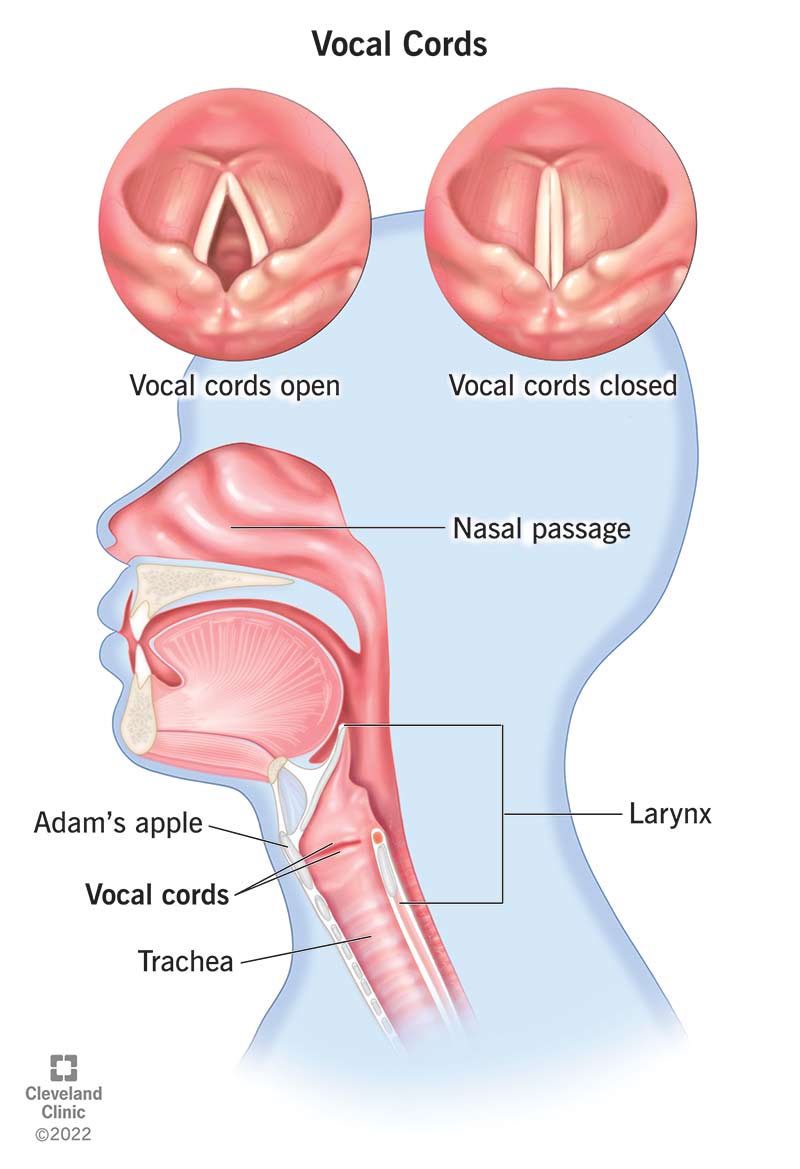Your vocal cords, or vocal folds, are two muscular bands inside your voice box that produce the sound of your voice. They also help you breathe and swallow food safely. You can damage your vocal cords if you’re not careful. Taking care not to overuse your voice or spend too much time at the top (yelling) or bottom (whispering) of your vocal range can help prevent injury.

Your vocal cords are two bands of muscle inside your voice box (larynx) that allow you to vocalize, or make sounds. Your voice box sits atop your windpipe (trachea), the tube that allows air to flow to and from your lungs. When you breathe in (inhale) and breathe out (exhale), your vocal cords open so air can flow freely. When you speak, your vocal cords close by meeting in the middle of your exhaled airstream and vibrate. The vibration creates the sound of your voice.
Most healthcare providers refer to vocal cords as vocal folds. The difference relates to structure. People once thought that vocal cords were like two strings (cords) of a musical instrument that vibrated when strummed or plucked. Now we know that each band consists of multiple folds. These folds aren’t isolated structures, like cords or strings. Instead, they connect to various muscles and cartilage inside of your voice box.
Cleveland Clinic is a non-profit academic medical center. Advertising on our site helps support our mission. We do not endorse non-Cleveland Clinic products or services. Policy
Most importantly, vocal cords produce the one-of-a-kind sound that you (and others) understand as your voice. They have other functions, too.
Your vocal cords protect your airway:
Your vocal cords also:
Structures in your face and mouth, like your soft palate, sinuses, teeth and tongue, work together to fine-tune the volume and sound quality your vocal cords produce.
Your vocal cords are inside your voice box (larynx), which is on top of your windpipe, directly behind your Adam’s apple. Your Adam’s apple is the bony protrusion in the front of your throat at the midpoint. If you place a finger or two on this spot and swallow, you should feel the protrusion move up. If you yawn, you should feel the protrusion move down.
Your vocal cords are two pearly white bands of tissue in the center of your voice box. A vocal cord on the right and one on the left meet to form a shape like an upside-down “V” when your vocal cords are open. When they’re closed, they come together to form a slit.
Your vocal cords stretch from the left to the right side of your voice box and from front to back. They connect to muscles and cartilage inside of your voice box that help control the movement of your vocal cords.
A moist, protective lining called a mucous membrane covers your vocal cords. Underneath the lining, vocal cords consist of three basic layers:
When you’re born, your vocal cords are about 6 to 8 millimeters long. They grow as you age into adulthood. The length and thickness of your vocal cords help determine how high or low your voice is, or your pitch. Thicker vocal cords produce a lower pitch, or a deep voice.
For some people, vocal cords and other muscles inside their larynx shrink and grow weaker with age, making it harder to talk.
The most common conditions that affect your vocal cords include:
Less common conditions include:
Symptoms depend on the specific condition affecting your vocal cords. They may include:
Visit a healthcare provider if you have voice changes that last longer than two weeks, like hoarseness or fatigue. Depending on your symptoms, you may need to see a voice specialist or an ear, nose and throat specialist (ENT) for a diagnosis. You may need to see a laryngologist, a specialist who treats disorders affecting the voice box. You may also see a voice-specialized speech-language pathologist.
During your visit, a healthcare provider will ask about your medical history and perform a physical exam. Additional tests and procedures may include a:
Common treatments include:
Voice therapy can help you speak more confidently and with greater control. It can also be a treatment for those whose gender identity differs from their sex assigned at birth. This voice therapy is called gender-affirming voice modification training or gender-affirming voice therapy.
The best way to keep your vocal cords healthy is to use them correctly without stressing or straining them.
Don’t:
Do:
A note from Cleveland Clinic
Your vocal cords allow you to speak, sing and even breathe. Although they’re small, your vocal cords allow friends and family members to recognize who you are by the sound they make when they vibrate. Protect your vocal cords from strain. Don’t overwork your vocal cords by speaking or singing for too long or too loudly. Avoid smoke (including second-hand smoke), and drink plenty of fluids. Keep your voice healthy by being mindful not to abuse your vocal cords.
Last reviewed by a Cleveland Clinic medical professional on 11/13/2022.
Learn more about our editorial process.
Cleveland Clinic is a non-profit academic medical center. Advertising on our site helps support our mission. We do not endorse non-Cleveland Clinic products or services. Policy